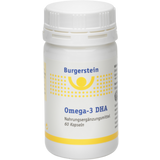Trans Fats: Creamy Danger
Croissants, donuts or fries: unhealthy trans fats hide in these and many other delicious junk foods. In recent years, awareness has increased regarding the negative effects of trans fats. In the US, they are now banished from all foods in order to protect consumers. In the EU, there are no uniform rules.
A few months ago the FDA, the Food and Drug Administration in America, banned artificial trans fats in food. Over the next three years, these fats will have to be removed from American food. This could prevent up to 20,000 heart attacks and 7,000 deaths in America per year.
What are Trans Fats
Trans fats are one of the unsaturated fatty acids. They can both naturally and artificially occur. Natural trans fats are produced by dairy animals like cows and are often contained in dairy products. Artificial trans fats are mainly produced in the industry. These are hardened vegetable oils and results in fats that are spreadable such as margarine. These artificial trans fats are cheap and durable, which is also the reason that they are used in many foods. Trans fats can also be produced when vegetable oils are heated, especially during frying or baking.
The recommended daily maximum value of calories that should be consumed with trans fats is one percent. Up to 80 percent of products that fall into this range are milk products. So there is not much room for maneuvering. In addition, this limit is only meant as a guide in the EU.
Legal regulations regarding trans fats were first made in Europe in Denmark in 2003. Industrially produced trans fats may account for a maximum of two per cent of food products there. Five other European countries (Austria, Hungary, Iceland, Norway, Switzerland) followed the example of Denmark and placed limits on trans fats in foods. In Germany or France, for example, there are still no statutory limits.
Why don't some countries have limits?
Unfortunately, trans fats are extremely harmful to our health. They are the most dangerous fats that exist because they promote cardiovascular disease and are also associated with various forms of cancer, diabetes and other ailments.
A new study has found yet another, unwanted effect of trans fats. Apparently an increased intake in trans fat increases the risk of depression. In this study, the effects of different fats were tested on the human psyche. More than 12,000 people were evaluated over a period of six years. Of the total participants, slightly more than 650 had depression. The evaluation showed that those participants who ate more trans fats had up to a 50 percent higher risk of developing depression. It is interesting that the study participants consumed a total of very little trans fats. Even the group with the highest trans fat consumption consumed only 0.4 per cent trans fat in proportion to their total calories consumed. This means that the maximum recommended amount was not nearly achieved.
So trans fats also have an influence on brain chemistry. Neurological processes can be disrupted or blocked. This disrupts function, plasticity and formation of the nerve cells.
In addition, people who suffer from depression are twice as likely to suffer from a heart attack. Trans fats increase not only the risk of heart attack, but also the risk of getting depression, which in turn increases the risk of heart attacks. It's a vicious circle.
Improper eating habits increase your risk of consuming too many trans fats. If you eat a lot of junk food, it is very easy to exceed the recommended amount of trans fats in your diet. Products that contain a lot of trans fats, include baked goods, processed products (mainly doughs), fast food, snacks, salty snacks, spreads and microwave popcorn.
We all know the saying "you are what you eat!" This phrase is of more and more importance. If you eat only unhealthy things, it impacts your mental and physical health. It's time to take another look at your diet. You don't need to make huge changes, just make small adjustments here and there and it can have many positive long-term effects.
Latest reviews
-
 3.8 (6)
3.8 (6)Alnatura Organic Coconut Drink, Natural, 1 l
Bestseller- Without added sugar*
- Gluten & lactose free
- Exotic flavour
€ 3,19 (€ 3,19 / l)Delivery by February 21
-
 5.0 (1)
5.0 (1)Panaceo Basic Detox Powder, 200 g
- Ideal as a companion during fasting diets
- With PMA-Zeolith®
- Authorised medical product
€ 42,99 (€ 214,95 / kg)Delivery by February 21
-
 5.0 (1)
5.0 (1)Burgerstein Omega 3 DHA, 60 capsules
- 470 mg DHA per daily portion
- 130 mg EPA per daily portion
- With vitamin E
€ 27,99 (€ 388,75 / kg)Delivery by February 21
-
 4.8 (4)
4.8 (4)Blue Farm Organic Matcha Oat Latte, 1 Set
- High-quality organic matcha
- With Lion's Mane vital mushroom
- Without additives
€ 27,99Delivery by February 21
